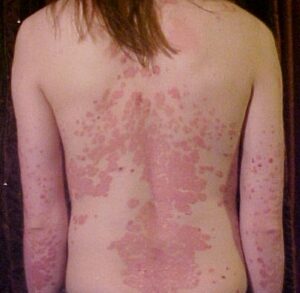
Individuals with psoriasis are always looking for ways to improve the inflammatory skin disorder, especially natural ways. A recent small study found that following a Mediterranean diet is a simple and effective way to reduce the symptoms of psoriasis (red, scaly patches and persistent itching).
Subjects with mild to moderate psoriasis were randomly assigned to one of 2 dietary groups. The group following a Mediterranean diet for 16 weeks had significantly reduced psoriasis severity and symptoms, when compared to the control group that were just told to follow a low-fat diet. Almost half of the Mediterranean group had a 75% reduction of psoriasis severity and symptoms! None of the low-fat diet group had a reduction in psoriasis severity and symptoms.
Additionally, all persons in the study were using their usual topical therapy for their psoriasis. The improvements in the Mediterranean diet group occurred without significant weight loss.
 The Mediterranean diet is rich in fruits, vegetables, whole grains, seeds, nuts, legumes, fish, and olive oil. In the study's Mediterranean diet group, the participants were not only given nutritional advice, but also a weekly provision of extra virgin olive oil. This diet is anti-inflammatory, which is why it may be so beneficial to those with psoriasis.
The Mediterranean diet is rich in fruits, vegetables, whole grains, seeds, nuts, legumes, fish, and olive oil. In the study's Mediterranean diet group, the participants were not only given nutritional advice, but also a weekly provision of extra virgin olive oil. This diet is anti-inflammatory, which is why it may be so beneficial to those with psoriasis.
Medical Xpress: Mediterranean diet leads to 75% symptom reduction in patients with mild to moderate psoriasis
Over 60 million people worldwide are affected by psoriasis, a chronic inflammatory skin disorder that causes red, scaly patches and persistent itching. A new study has found that following a Mediterranean diet—rich in plant-based foods, extra-virgin olive oil, and a moderate amount of fish, and poultry—could provide relief to psoriasis symptoms.
In a randomized clinical trial involving 38 adults with mild to moderate psoriasis, nearly half of the participants who followed the Mediterranean diet for 16 weeks experienced at least a 75% improvement in their symptoms, whereas no such effect was observed in the control group.
Previous studies have often linked improvement in psoriasis to significant weight loss alone. The researchers of this study suggest a different mechanism at work. The beneficial effects of the Mediterranean diet appear to stem from its inherent anti-inflammatory and cardiometabolic properties. These properties may directly target the biological processes that drive psoriasis symptoms, rather than relying solely on calorie restriction.
Psoriasis is driven by an overactive immune system. In a normal immune system, the white blood cells protect us by attacking harmful invaders, such as viruses and bacteria. In a person with psoriasis, the T-cells mistake the body's own skin cells for foreign objects and start attacking them. This triggers the body to produce new skin cells too quickly, and the buildup of these extra cells on the surface leads to the visible patches of psoriasis.
The Mediterranean diet supports psoriasis management through multiple pathways. Its rich mix of fruits, vegetables, nuts, whole grains, olive oil, and fish contains high levels of antioxidant vitamins, including β-carotene, vitamin C, and vitamin E, along with plant compounds like polyphenols, help reduce oxidative stress and calm inflammation.
A randomized clinical trial was needed to test the diet's true impact, and that is exactly what researchers of this study set out to do with the MEDIPSO (Impact of the Mediterranean Diet on Patients With Psoriasis) trial.
This open-label, single-center, single-blinded randomized clinical trial was conducted between February 2024 and March 2025 at a dermatology referral clinic in Madrid, Spain. It enrolled 38 adults with mild to moderate psoriasis, defined by a Psoriasis Area and Severity Index (PASI) score of 2–10, where higher scores indicate more severe disease. Participants were evenly randomized into two groups. The intervention group completed a 16-week Mediterranean diet program guided by a dietitian, and the control group received only standard low-fat diet advice without dietitian support.
The results revealed that 47.4% of participants following the Mediterranean diet achieved a PASI 75 (a 75% reduction in severity) compared to 0% in the control group and these improvements occurred without significant weight loss. Participants who stuck more closely to the Mediterranean eating pattern saw even improvements in their skin condition and experienced better quality of life, improved sleep, and reduced anxiety.
